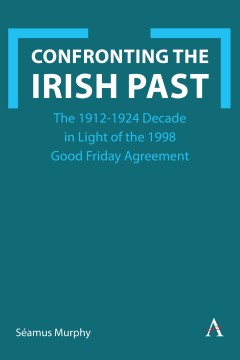Confronting the Irish Past
The 1912-1923 Decade in Light of the 1998 Good Friday Agreement
By Séamus Murphy
Other Formats Available:
- About This Book
- Reviews
- Author Information
- Series
- Table of Contents
- Links
- Podcasts
About This Book
Hannah Arendt, Jewish refugee from Nazi Germany, argued that some parts of history need not just to be understood but to be confronted as well. The 1998 Belfast or Good Friday Agreement between the two communities (nationalist and unionist) in Northern Ireland arranged power-sharing structures of governance between them. The Agreement was underwritten by the British and Irish governments. The signatories of the Agreement knew that its success required a cultural shift or conversion in each community.
To that end, the decisive and violent decade of recent Irish history, 1912–1923, needs to be confronted. In that decade, there were several conflicts: between Protestant unionists and Catholic nationalists, between nationalist insurrection and British forces, and between two nationalist groups. At the end of the decade, the country was partitioned: the south had become an independent dominion within the British Commonwealth, while the north continued as part of the United Kingdom.
The division was bitter and violent, with each community (nationalist and unionist) effectively rejecting the right of the other to exist. That remained unchanged until the violence in Northern Ireland in the 1970s. While the vast majority on both sides want peace and mutual recognition, the traditional construction of each community’s historical memories obstruct that. The goal of the book is to analyse the different elements required for each community in how to confront that history in the interests of affirming identity, giving recognition to the other community and building a shared political community.
Reviews
‘Written in an unfussy and accessible style, Confronting the Irish Past is intellectually serious and conceptually ambitious. The author’s erudite reflections on the uses (and abuses) of the past and on the ethics of commemoration will interest, provoke, and challenge readers in equal measure.’ — Dr Brian Hughes, University of Limerick, Ireland
‘Commemorations provoke the question of how and why violent events from the past might be celebrated. What are historians doing when they attempt to provide a truthful account of the past? Can there be an ethical evaluation of those events that respects the truth? Séamus Murphy’s excellent transdisciplinary approach shows how.’ — Dr Patrick Riordan, Senior Fellow in Political Philosophy and Catholic Social Thought, Campion Hall, University of Oxford, England
‘Murphy has written a meditation on the bitterly contested, ever-evolving political identity of twentieth-century Ireland that combines engrossing historical narrative with philosophical reflection on the multiple purposes historical narrative serves in all its many forms. The philosophical excursus on historical memory is a tour de force that scholars of Nietzsche and Arendt will especially appreciate.’ — David Ingram, Professor of Philosophy, Loyola University Chicago, United States
Author Information
Séamus Murphy is professor of philosophy at Loyola University Chicago. He writes on philosophy and public policy. He is a Jesuit.
Series
Table of Contents
Acknowledgements; Chronology; Abbreviations and other Names; 1. Introduction; 2. Historians: Objectivity and Value; 3. L’homme Armé: Three Civil Conflicts; 4. Policy and Governance; 5. The Ethics of Social Memory; 6. Identity, Recognition, Politics; References; Index
Links
Stay Updated
Information
Latest Tweets



